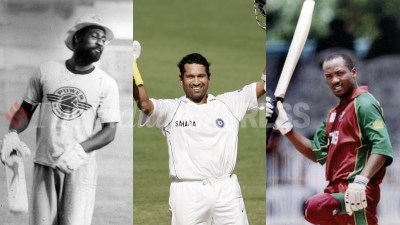Stay updated with the latest - Click here to follow us on Instagram
The Last Word
The nondescript building of Encyclopedia Britannica in the dusty and not so posh bylanes of Greater Kailash- 1 in New Delhi,which could have gone unnoticed otherwise,is bound to invite more than a mere glance now.
Succumbing to the digital revolution that has left the household name of Encyclopedia Britannica obsolete,the complete digitisation of the 244-year-old reference source is the end of an era
The nondescript building of Encyclopedia Britannica in the dusty and not so posh bylanes of Greater Kailash- 1 in New Delhi,which could have gone unnoticed otherwise,is bound to invite more than a mere glance now. There will be nostalgia,sadness and even cynicism,blaming online revolution for the demise of the printed edition of Encyclopedia Britannica. After the 244-year-old international household name decided to stop printing and give in to complete digitisation last week,people are still grappling with the news and rushing to the stores to get the last few copies of the historical set. And Indian headquarters of the Chicago-based Encyclopedia Britannica Inc in the Capital is one place,where the staff,even before the news could sink in,is busy handling calls from people reacting to the news and the sudden soaring sales.
If something historical is erased,people react. They have called and enquired,and families have woken up to buy more sets than ever before. You have to see the effect it had on the US. In just three days,25 per cent of the stock was sold out, says K M Thomas,managing director,Encyclopedia Britannica India,who in the middle of all the development,is suddenly a busy man. He firmly adds that its not about gimmicky sales but a firm decision.
Somewhere around the turn of 20th century,the towers of Encyclopedia Britannica the paper and ink one were one of the most significant sections in public and private libraries in India and all over the world. The books could never be issued and the consultations had to be made in the libraries only. Those who were the hereditary owners of these alphabetical sets of human knowledge were even respected more in social circles. It all continued until digital media gave us all of Encyclopedias information at a click,and now,a mere touch.
Tel Aviv-based Leah Mansoor,the senior vice-president,international business,Encyclopedia Britannica Inc,further informs that the direct sales of the books,as observed by the 12-year-old office,have been stable in India but in the West,they have declined every year. Britannicas direct sales in India are relatively new compared to our 244-year-old history. During those years we sold around 1,100 of each edition over a period of two-and-a-half years. It was,however,distributed in India before through various distributors, she says.
Founded in Edinburgh,Scotland,in the 18th century,with first publication between 1768-71,the 32-volume Encyclopedia Britannicas first edition was followed by 14 more with William Smellie as its first editor. Over the years,the various volumes have resulted in ambitious and extensive education and reference material that boasts of contributors,from initial ones like historian and economist James Mill,British anthropologist Sir Edward Burnett Tylor,theoretical physicist Albert Einstein,to more recent ones such as tennis players like Chris Evert,mountaineer Tenzing Norgay,former US President Bill Clinton and South African activist Desmond Tutu.
Even though the first digital version came out in 1981,the first multimedia encyclopedia on CD-ROM came out only in 1989,and the first on internet in 1994. The decision to stop printing,says Mansoor,comes after the need to evolve with the times. We understand other peoples sadness,but this is something that we knew would eventually happen and our employees around the world took part in this decision. Its the latest step in our evolution from the print publisher that we were,to the creator of digital learning products that we are today. It will now allow us to focus completely on digital versions of the Britannica, she says.
Thomas,who does not own a single set of Encyclopedia Britannica,looks at the neat collection in his office with pride and some nostalgia,keeps to the thought that change,in any form,is necessary and will get negative reaction. But its normal,because when the whole thing sinks in,you will see things in perspective. Theres a change in the market and you have to adapt and accept it, he concludes.







